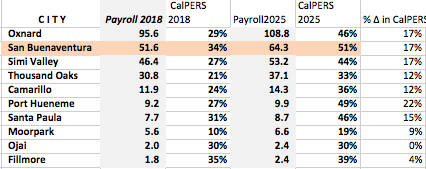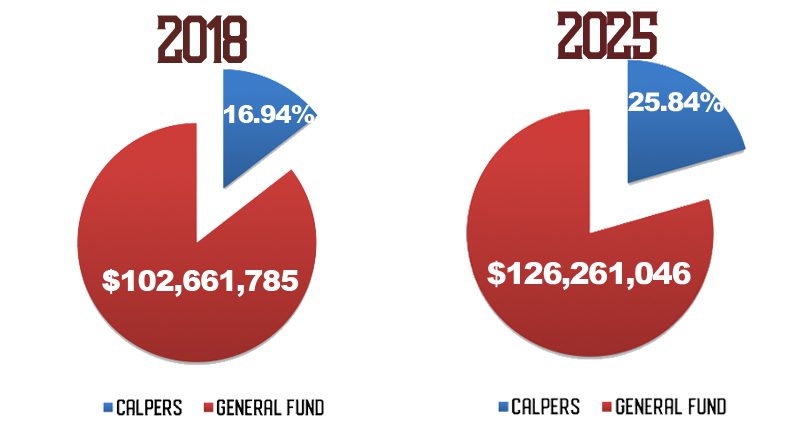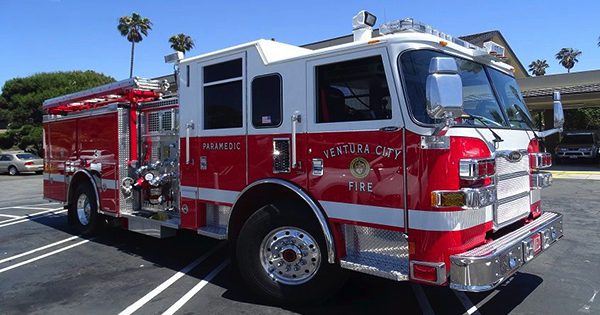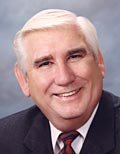
“Courage Cannot Be Counterfeited. It Is One Virtue That Escapes Hypocrisy”
—Napoleon Bonaparte

The City of Ventura has a spending problem, and it’s time for an intervention. The fiscal crisis is not widely understood. At its core are the promised unfunded pensions for public employees.
Ventura’s pension contributions for 2018 are $17,410,000. The annual contributions will balloon to $32,630,000 by 2025. That’s a compound annual growth of 9.4%. No other expense item in the US economy is growing that fast. As of 6-30-15, the entire unfunded liability for the City of Ventura is over $169.2 Million ($169,292,212). It is not possible to get out of the CalPERS retirement plan. As of 6-30-15, to terminate the CalPERS plan would costs $1.2 Billion ($1,197,537,902).
Ventura is not alone. Cities up and down the state must face up to the problem. However, Ventura’s pensions are a debt time bomb.
 Ventura is already paying 34 cents to CalPERS for every dollar it pays its active employees. In six years, that amount will go up to an unsustainable 51 cents for every dollar of payroll—more than any city in Ventura County. Pensions are already crowding out other essential city services like filling potholes, fixing infrastructure and even hiring more police officers and firefighters.
Ventura is already paying 34 cents to CalPERS for every dollar it pays its active employees. In six years, that amount will go up to an unsustainable 51 cents for every dollar of payroll—more than any city in Ventura County. Pensions are already crowding out other essential city services like filling potholes, fixing infrastructure and even hiring more police officers and firefighters.
How Pensions Affect You Directly

Pensions Will Crowd Out Needed City Services
Expect senior programs and after-school activities to disappear first. Next, the city will defer maintenance and capital
expenditures. The city will extend service contracts for police cruisers, city vehicles, and equipment. These things represent only a fraction of Ventura’s budget. Reductions in services will never be enough to stop the detonation of the pension debt bomb.
Ventura can only fix the problem by raising taxes, cutting needed services, or both. There is a direct correlation between the money Ventura spends on pensions and the city’s ability to pave streets and repair sewers.
Reckless Spending Continues
Despite knowing this, Ventura’s City Councilmembers increase spending without regard to the long-term consequences.

The Roving Fire Truck Crew Adds To Ventura’s Pensions
Last month, the Council voted 4-2 to give the fire department $600,000 for a roving paramedic fire engine. City staff, the fire department and the fire union proudly pointed out grants and budget manipulation will pay the first year expense. No one on the Council asked what happens in year two and beyond. Fire Chief David Endaya asserted Ventura needs the engine because of an increase in calls. Yet he lacked specifics about whether there are more cost-effective ways to deliver the services.
To their credit, Councilmembers Mike Tracy and Christy Weir voted “No.” They wanted more details. Nonetheless, the Ventura Fire Department got its new engine, even though no one gave adequate data to support the decision.
Interim City Manager Dan Paranick did not recommend funding the roving engine for this year. Paranick worked with Fire Chief Endaya, but in the end, he said, “I haven’t gotten myself to a place where I’ve been comfortable yet, where I could sit here and justify the need based on the demand. That’s why I did not recommend it.”
Days later, he announced his resignation to accept a position closer to his home in Simi Valley.
The Fire Department isn’t the only group benefiting from the spendthrift City Council. Earlier this year, the police received pay increases of 5% adding to the city’s future pension liability.
In 2017, 90 of the top 100 salaries on the city payroll are police officers and firefighters. Every one of the Top 100 earns more than $198,800 in pay and benefits. For perspective, the average family in Ventura earns $66,000 per year with two wage earners.

In reality, Ventura pays pensions for 3.3 retired police and fire employees for every two public safety employees on the job. That’s untenable.
So how is the Ventura City Council managing spending, and considering the long-term financial effect of their decisions? In short, they’re not.
Elected officials first believed the extra $10.8 million collected from Measure O would afford them the ability to meet new programs. But, Measure O is now a supplement to existing projects. Councilmembers frequently discuss the need for tax increases.
Moreover, it is not only about pensions.
- According to the Capital Improvement Plan (CPI), Ventura Water Department insists on spending $538 million to convert wastewater into drinkable tap water. There remains the probability that water rates will increase by 200%.
- Ventura’s golf courses lose $1.7 million annually on the debt they incurred.
When the money runs out, it has forced other cities to find solutions. They turn to the only tools they have at their disposal: raising taxes, cutting needed services, or both. Some even filed bankruptcy.
Economist Herbert Stein once said, “If something can’t go on forever, it won’t.” Ventura is on a trajectory that cannot go on forever.
Your Chance To Make Ventura Better
 This November, Ventura has an unprecedented opportunity to tell the City Council, “No more new spending.” There are three open seats on the Council in this November’s election.
This November, Ventura has an unprecedented opportunity to tell the City Council, “No more new spending.” There are three open seats on the Council in this November’s election.
Past financial overspending must stop. New Council Members with an economic understanding of operating a city must prevail. Voters need to look past the individual candidates’ popularity to carefully consider their ability to understand and manage city finances.
Desirable candidates will:
- Treat city money as if it was coming out of their pocket, which it is
- Understand the Comprehensive Annual Financial Report (CAFR) before taking office
- Understand the city budget and capital expenditure projects
- Hold city staff accountable to present successful projects to the Council
- Hold the City Manager accountable for results
- Make difficult decisions knowing their decisions will anger some constituents
- Do the right thing, not the same old, easier thing
- Represent of the citizens of Ventura, not be a cheerleader for city staff recommendations
Editors Comments
You have the opportunity to make Ventura better this November. Voter turnout needs to be high for this crucial City Council election if Ventura is to improve. Decisions these new Councilmembers make will immediately impact the city’s economic vitality. We mustn’t leave this election to chance.
Encourage people to vote. Educate everyone on the grave crises facing the city today. Ask candidates how they plan to address these crises. Listen to their answers. Hold them accountable after they’re elected. If we do all these things, we’ll improve the chances Ventura will remain fiscally sound now and in the future.
Hold These Councilmembers Accountable For Their Past Spending
Below you’ll find the photos of our current City Council. Click on any Councilmember’s photo and you’ll open your email program so you can write directly to that Councilmember.
Let them know what you’re thinking. Tell them what they’re doing right and what they could improve upon. Share your opinion. Not participating in government weakens our democracy because our city government isn’t working for all of us.
 Neal Andrews, Mayor |
|
 Matt LaVere, Deputy Mayor |
 Cheryl Heitmann |
|
 Jim Monahan |
 Erik Nasarenko |
|
 Mike Tracy |
 Christy Weir |
|
|
For more information like this, subscribe to our newsletter, Res Publica. Click here to enter your name and email address.
What Do You Think Of The Tactics Used By Ventura Fire?
/in General News/by VREG EditorsVentura Police officers sign a new contract with a 5% pay increase. The timing of the announcement was questionable. It came on the heels of the Anthony Mele, Jr. murder. However, the agreement was a fair one.
Ventura Fire Unhappy With The Proposed Contract
Agreed upon union contracts form the basis for negotiating other city union contracts. In this case, Ventura Firefighters are unhappy. Union Leader Captain Shawn Hughes says the union voted against a similar pay raise. He wrote Councilmembers, “We are demanding change. Working conditions need immediate attention. The citizens of Ventura deserve properly staffed public safety departments.” Captain Hughes earns $216,885 per year in pay and benefits—putting him in the top 5% of wage earners in the country.
In April, Hughes began his campaign for higher pay. He emailed the City Council, Interim City Manager Dan Paranick and Fire Chief Endaya. Hughes contacted individual Councilmembers behind the scenes to negotiate a better deal.
The Fire Union Turns Up The Heat
In early May, Hughes ratcheted up his behind the scenes negotiations. He formally requested the City Council stop all public education and outreach immediately. He reasoned that public awareness was “now an unsafe practice. “We need to maximize the number of available resources to maintain public safety that this community demands.”
In short, Hughes was exhorting the Council. He was demanding all public outreach stop until the city hired those firefighters.
The fire union contributed to several Councilmembers’ campaigns. Current Councilmembers Jim Friedman, Cheryl Heitmann, Matt LaVere and Erik Nasarenko received contributions.
On January 14, 2019, the City Council consented to accept VFD’s salary increases. The increases were the same as the Police Union received.
Special Precaution Continues After Murder On the Promenade
/in General News/by VREG EditorsJamal Jackson stabbed Anthony Mele, Jr. to death on Ventura’s Promenade in April 2018. Once again, the city was in the national news.
Poor Judgment Exercised With The Murder On The Promenade
Jamal Jackson
Jackson was a repeat offender and homeless. Many citizens jumbled his criminal act and his impoverished state. Ventura Police received a call that Jackson was acting suspiciously. Patrol units were not immediately available. Instead, the dispatch center observed Jackson via remote camera. Two and a half hours after the initial call, Jackson committed the murder.
The crime prompted an immediate reaction by Ventura Police. First, patrols along the promenade increased. At first, two officers patrolled the boardwalk 20 hours per day. Shortly after that, police expanded the patrol radius to include downtown. In July 2018, the City Council approved funds to continue the patrols. Now two officers patrol 12 hours per day. Arrest data increased since the incident. Ventura Police still deal with a significant number of recidivist criminal homeless.
Police Response To The Murder On The Promenade
Following the incident, the Police department reviewed its procedures. Chief Ken Corney admitted lousy judgment. Substituting video monitoring for an officer responding was not the right choice. Since then, there have been changes
The review also concluded police adequately prioritized the call when it came in.
Policing The Homeless Gets Harder
In September 2018, the 9th Circuit Court of Appeals issued an opinion in Martin v. Boise. The ruling hinders Ventura Police’s ability to curb homelessness. The court concluded that imposing criminal penalties for sleeping outside on public property violates homeless persons’ Eighth Amendment rights. They deem it cruel and unusual punishment.
Within two months, the community returned to business as usual. Public outcry diminished, but the problem of criminal homelessness continues.
Ventura Has Opportunity To Improve After The Thomas Fire
/in General News/by VREG EditorsThe City Council waffled on second-story height restrictions for rebuilding victims’ homes. Indecisiveness delayed the rebuilding process for many. Councilmembers exhibited big hearts and small brains settling on the new height ordinance. They attempted to please fire victims wanting to improve their homes. Doing so delayed rebuilding for everyone. It was clear that many of the burned houses would have to come up to existing building codes. Many of the homes were built decades ago when the codes weren’t as strict. Plus, setbacks from the street had also changed. For fire victims to rebuild their houses “as is” would cost more. The new home would have a different footprint on the lot and impede neighbors’ views.
There was another consequence of the Council’s lack of urgency. Most homeowners’ insurance provides 18-24 months of living expenses while rebuilding. The Council’s delay will force rebuilding beyond 24 months for many homeowners. As a result, those homeowners will have an added financial burden. They will pay for temporary living expenses when their insurance runs out. Plus, they will also be paying their mortgage on a destroyed home.
Don’t Miss This Chance To Improve After The Thomas Fire
The City Council’s inaction delayed a significant economic stimulus for Ventura. It reinforced the perception that Ventura lacks urgency and is bureaucratic. Now, there is a new City Council. We hope they’ll look at this process with a fresh perspective. If they do, they’ll see the need for change. We want them to force the city staff to streamline and simplify the building and permitting process.
What Prevents The Thomas Fire Findings From Being Public?
/in General News/by VREG EditorsTo understand 2018 begins by understanding December 2017 and the Thomas Fire. The fire destroyed 535 houses in Ventura. It scarred the hillside, displaced families, and created unprecedented demands for services. It was Ventura public safety’s finest hour. Police and firefighters performed heroic feats. As a result, no Ventura residents died in the fire.
Thomas Fire Findings Part Of A Mixed Recovery
Thirteen months later, the report card on Ventura city government is not as good. The city did not continue the success public safety exhibited during the fire. Ventura had the opportunity for a significant economic stimulus but failed to capitalize on it. Rebuilding the homes will stimulate the local economy by $350 million. The only thing standing in the way of that economic windfall is the city. In the intervening time, the city issued 165 building permits. The city staff beefed up with contractors to help with the workload for these results. The city staff wasn’t entirely to blame. The City Council waffled on second-story height restrictions for rebuilding victims’ homes. Indecisiveness delayed the rebuilding process for many.
Delayed Thomas Fire Findings
Powerful VFD Union Exerts Its Strength On The Council
/in General News/by VREG EditorsThe City Council approves a $600,000 per year “roving” fire engine and three paramedics in June 2018. Ventura Fire insisted they needed the engine because response times “were especially high.” He gave no information on what’s driving the increased calls for help. Nor did he offer any cost-effective alternatives to deliver the services.
Uncertainty Over The Fire Engine
Ventura Fire Chief David Endaya wasn’t sure what targets the roving engine could hit, or by how much response times could fall.
Even so, Councilmembers Cheryl Heitmann, Matt LaVere, Jim Monahan and Erik Nasarenko voted for it. Councilmembers Mike Tracy and Christy Weir voted against it.
The Reason VFD Got Its Fire Engine
What motivated four Councilmembers to override the City Manager’s recommendation? Why did they believe the city needed to spend $600,000 in 2018? Simple. In late May, Union Leader Battalion Chief Doug Miser requested a meeting with each Councilmember. He wrote, “As you are hopefully aware, every single member of the Ventura Fire Management group dedicated a significant amount of time in call banks and walking districts to pass Measure O. We believe we are way past due in staffing another fire station in the city.” Two months later, the Ventura Fire Department had a new engine and three new paramedics.
The Councilmembers heard Miser’s message loud and clear. Ventura Fire contributed during their campaigns. Ventura Fire helped deliver Measure O money to the city’s General Fund. Now, it’s time for quid-pro-quo.
What’s more, Chief Endaya announced a hiring decision. He hired two of the three paramedics before they approved the roving fire engine. He said they’d been “over-hired” in anticipation of adding City Fire positions.
Proposition 218 Is The Fastest Way To Raise Money, But Is It Right?
/in Newsletters/by VREG Editors—Thomas Jefferson
Ventura Water will push the boundaries of the law as it tries to use Proposition 218 to raise money to meet the Wishtoya Foundation Consent Decree.
In the next 12 months, Ventura Water will ask the City Council to increase water rates for 30 wastewater projects and 28 water projects by 2024. These costly projects will benefit some property owners. Other projects will help the community at large.
As of June 30, 2018, Ventura Water accumulated $115,000,000 for projects they planned to build between 2012-2018. Still, they need $449,586,000 more before 2024. How did we commit to spending almost $450 million, and why weren’t you asked to vote on it?
WHAT WILL THIS COST YOU?
These new rate increases will come on top of the increases imposed over the last six years. In 2012, Ventura Water wanted to increase rates to:
In 2012 the average homeowner and family of 4, received a bi-monthly bill of $73.27 and sewer charges of $72.45 for a total of $145.72. That same family is paying $105.03 for water in 2018. Add sewer charges of $104.64 and their total bill is $209.67. This is a 43% increase over the 2012 rates.
From 2018-2024, expect a similar rate of growth. Your new water bill may look like this:
HOW DID WE GET INTO THIS SITUATION?
Keep in mind that voters had no voice in the City Council consenting to the decree in 2012. Now, Ventura Water wants to deny voters the chance to say how we spend the money to meet the order, too. It plans to use Proposition 218 to get those funds.
HOW AND WHY CAN VENTURA INCREASE MY RATES?
So h ow can Ventura Water impose such large fees against its citizens without the traditional right to vote on such matters? The answer lies in how Ventura implements Proposition 218. Approved by the voters in 1996, Proposition 218 allows Ventura to raise money in one of three ways:
ow can Ventura Water impose such large fees against its citizens without the traditional right to vote on such matters? The answer lies in how Ventura implements Proposition 218. Approved by the voters in 1996, Proposition 218 allows Ventura to raise money in one of three ways:
VENTURA WATER TURNS A NON-VOTE INTO A YES VOTE
Ventura wants to use option C, Special Assessments, Fees and Charges to impose higher water rates.
Here’s how they’ll do it. Instead of putting it on the ballot, Ventura Water sends a water bill. Somewhere in the body of that bill, it tells you why the rate increase is necessary. You may dispute the rate increase by voting “NO” within 45 days, but the process is cumbersome. To disagree, you must download a protest form, complete and mail it or take it to City Hall by a specific date. Fail to jump over those hurdles and the City doesn’t care what you think or want. If 51% of the ratepayers have not voted ‘NO,’ that is the end of the matter. There are 32,000 ratepayers. Sixteen thousand one must vote NO to defeat an increase.
Proposition 218, now Article XIII C and D of the California Constitution, made the following findings:
When the City sought the last rate increase they took the position that they had the right to raise the rates without prior voter approval. They believed the procedures they followed were consistent with Prop 218 language, as interpreted by the California Supreme Court. They maintain that they “may raise other fees or impose new fees without prior voter approval” for anything they chose to label a water or wastewater project.
But it doesn’t end with this interpretation alone. A California Supreme Court challenge goes further.
TESTED IN THE COURTS
The California Supreme Court in Bighorn-Desert View Water Agency v. Verjil (2006)39 Cal.4th 205, at page 205, addressed the question of whether voters had the right to put an initiative on the ballot to reduce water rates. The court ruled in favor of the water agency and interpreted Prop 218’s language to mean a city “may raise other fees or impose new fees without prior voter approval.” The Court’s decision was specific. It didn’t involve the question of whether imposing fees to deal with a Consent Decree are valid.
Notwithstanding the protective measures of Prop 218, the City of Ventura conveniently interprets Prop 218 to still impose fees and charges beyond the simple costs of service to the homeowner. However, the court never went that far.
The City of Ventura’s interpretation of Proposition 218 is overreaching when it comes to any matter about water, wastewater and related environmental projects.
That decision by the Supreme Court only involved the issue of water delivery through a pipeline and whether voters could use an initiative process to require prior voter approval for the costs of that delivery. It did not involve a question of whether fees imposed to deal with a $500 million water and wastewater projects together with environmental costs, expert studies, attorneys fees and a plethora of expenses arising out of a ConsentDecree decided by a City Council in 2012, and in which the voters had no voice.
What if the costs are not exclusively operational costs? What if the expenditures benefit the entire community, not just ratepayers? Does Proposition 218 apply in those circumstances? Bighorn-Desert View Water Agency v. Verjil does not answer these questions.
No Precedent For What They Plan To Do
In determining whether to seek prior voter approval, we hope that the new City Council will keep in mind the following the language from the Supreme Court in Bighorn case:
THE CITY MAY FACE A SERIOUS LEGAL CHALLENGE
If the City is considering rate increase of this magnitude without prior voter approval they should be mindful of the language in Prop 218. It provides that “in any legal action contesting the validity of an assessment, the burden is on the agency (Ventura Water) to demonstrate that the …properties in question receive a special benefit over the benefits conferred on the public at large…”
Complying with the Consent Decree by not putting wastewater into the Santa Clara River benefits all citizens, not just ratepayers.
Editor’s Comments
Ventura Water is proposing a mix of costly projects. Some will benefit property owners, and some will help the community at large. Building a pipeline and related infrastructure to import state water at the cost of $50 million benefits all property owners. Ratepayers generally accept this. Spending beyond that to build projects to satisfy a federal judgment on the Santa Clara Estuary to protect the ecology of the estuary is a problem.
Proposition 218 may not cover projects to meet a federal judgment on the Santa Clara Estuary to protect the ecology. We recommend a vote of the citizens in that instance.
Warn The City Council Of Ventura Water’s Potential Error
Below you’ll find the photos of our current City Council. Click on any Councilmember’s photo and you’ll open your email program ready to write directly to that Councilmember.
Let then know that Venturans must vote on a water rate increase to pay for the consent decree. Not participating in government makes us worse because our city government isn’t working for all of us.
For more information like this, subscribe to our newsletter, Res Publica. Click here to enter your name and email address.
How To Connect To Your 2019 Ventura City Councilmembers
/in General News/by VREG EditorsTo make democracy work, we must be a nation of participants, not simply observers.
—Louis L’Amour
Our federalist system gives us many opportunities to participate in our democracy. Some forms of participation are more common than others. And some citizens participate more than others, but almost everyone has a voice in government.
Meet Your 2019 City Councilmembers
We have a new Ventura City Council for 2019. We have three new Councilmember sand four incumbents. Each of them has an email account with the city. Not everyone knows how to contact them, though.
Governing By Districts
For the first time in Ventura’s history, our Councilmembers were elected by districts. While each Councilmember was elected by constituents in their district, they serve the entire city. You should feel free to contact any Councilmember regardless of the district in which you live.
Click On A Councilmembers Photo To Email
Below you’ll find the photos of our current City Council. Click on any Councilmember’s photo and you’ll open your email program ready to write directly to that Councilmember.
Let then know what you’re thinking. Tell them what they’re doing right and what they could improve upon. No matter what you write, however, share your opinion. Not participating in government makes us worse because our city government isn’t working for all of us.
For more information like this, subscribe to our newsletter, Res Publica. Click here to enter your name and email address.
Take Notice Of The New City Manager In The First 100 Days
/in Newsletters/by VREG Editors“…Great responsibility follows inseparably from great power.”
—Voltaire
What’s next for Ventura with a new City Council and a new City Manager? Is Ventura better prepared to meet the challenges of 2019 and beyond? At the inception, the answer may be no. It takes time for city government to change course even if danger signals abound. Given time, however, there are many things to be hopeful about.
Ventura Welcomes A New City Manager
As of this week, Ventura’s new City Manager, Alex McIntyre, started his new position and will begin getting acquainted with staff, community leaders and the city at large.
Because the former City Manager, Mark Watkins, left the City Manager position in December 2017, Ventura has operated with interim city managers for 11 months. During that time, city employee turnover and vacancies has become problematic. One job site showed 55 City of Ventura job openings alone.
The first priority will be filling positions critical to providing departmental leadership, and in turn quality public services. Key positions, such as Public Works Director and Finance and Technology Director, will likely be filled by one of Mr. McIntyre’s own team members. Other key positions and new direction are badly needed in a community that is still struggling with the Thomas Fire rebuilding programs.
As an example, while one planning checklist says that a Mechanical, Electrical, and Plumbing services report (MEP) is not required for homes under 3,000 sq. ft., Building and Safety has been known to request an MEP anyway. While maybe this request is made as an abundance of caution, it places long delays and huge costs and angst upon the fire victims. Another homeowner, who lost their home in Clear Point, remained upset that after the height allowance for 2 story homes was increased because of complains by homeowners, the height allowance for single story homes was decreased.
While these types of arbitrary decision can be appealed, an appeal process may take months or longer. For folks who just want to get past the nightmare and get back into their home, this is a cruel and harsh procedure. It is strongly suggested that the process be reviewed and a streamline. It is recommended that a 5 day appeal process be implemented to eliminate any bottlenecks in the building & safety and permit process. This would be a good first step for our new City Manager. Building confidence in his leadership is very important for the community.
A New City Council And A New City Manager
Finally, getting a realistic handle on whether to now spend another $536 million on the Capital Improvement Plan (CIP) projects, for new water and wastewater plants, within the timeframe mandated by the Wishtoya Foundation Consent Legal Decree, or extend the date for compliance of that agreement is extremely important.
Compliance with the current deadline of January 1, 2025, is likely improbable. That 2025 deadline for compliance is looming, yet after 6 years of numerous biological studies, the State Water Board has still not made any decision on how much of the 9 million gallons per day of treated wastewater can continue to be released into the Santa Clara Estuary, or how much of that wastewater must be pumped and used for other purposes.
Nowhere in the U.S. have regulatory standards been approved for DPR. Notwithstanding these hurdles, the majority of this past City Council has continued to march toward compliance by 2025, and continue to plan to raise water and wastewater rates to build projects for DPR. It is obvious that the City of Ventura must take further action available through the Wishtoya Agreement. Read the Consent Decree here.
In 2017, Ventura experienced one of the worst disasters in its history with the Thomas Fire. The city’s financial and human resources have been extended beyond its limits. Add that to the burdens of a Federal Consent Decree agreed to in “private session” by the City Council in 2012, and our community faces real financial distress. It is imperative that the City of Ventura take the legal steps now and direct the City attorney to petition the court to extend the implementation deadline until 2030 -2035. The Consent Decree recognizes and permits that process in article 26. Why the immediate past City Council has been dragging their feet on this issue is perplexing. If there is a good reason, nobody is sharing it with those who matter – the citizens and rate payers.
Editors’ Comments
With great power comes great responsibility. The new City Council and City Manager bear the burden of facing daunting challenges. We hope they will be powerful enough to meet those challenges.
Latest Exclusive Insider Advice For Council Candidates
/in Newsletters/by VREG Editors—Lewis Carroll
Ask anyone what the pressing issues are facing Ventura; you’ll get a variety of answers. With the unprecedented departure of three serving City Councilmembers, this is an excellent time to get the perspectives of those who have served. Having interviewed the retiring Councilmembers and some former Council candidates, all point to several significant issues facing Ventura’s next City Council in the next few years.
For the first time in Ventura’s history, voting districts divide the city. The districting forced Mayor Neal Andrews and Councilmember Mike Tracy to retire. Councilmember Jim Monahan decided to retire after forty years of service. New Councilmembers will bring fresh perspective and energy to the Council. They also will face a steep learning curve to be effective.
Governing By Districts
City Council Candidates will serve by district
As citizens expect their elected officials to represent their district’s interests, concern for the city as a whole may take a backseat to districtwide issues. That can be a problem when the demands regarding traffic, housing, crime and services of the districts don’t mesh with the other districts’ views.
Nowhere was this more evident than in the first forum for District 1 candidates. Citizens expressed concern for a Westside pool, learning how governing by districts will work, affordable housing and labor force opportunities. Very few of these issues aligned with what the outgoing politicians thought was most important: 1) growth 2) water 3)homelessness and 4) staff accountability.
Governing by districts means inexperienced new Councilmembers will lead the city. Inexperience means two things. First, existing Councilmembers and city staff may marginalize them until they gain experience and knowledge. Second, the new City Manager and the city staff may take more control without voter accountability. Neither of these is good.
More distressing may be the loss of a citywide perspective on the Council. Wrangling for projects will probably intensify. It is likely that Westside swimming pool proponents will battle the Kimball Park proponents over who gets funding, for instance.
Re: Growth
Growth meant different things to each interviewee. All agreed Ventura needed to grow. They also concurred that growth and water availability are inseparable. Each acknowledged the need for affordable housing but recognized the opposition to more houses (the NIMBYs). Forward progress on growth means accommodating, integrating and compromise.
The Solution is Sensible Growth
Growth and water are inseparable—you can’t have one without the other. The next City Council must forge a reasonable growth plan. The new Council will also have to convince the “no-growth” citizens that the city needs to grow to be vital. The Council should also call for the city staff to streamline current fees and permits practices.
Re: Water
Everyone acknowledged water was a concern. The specifics on how to address the issue varied widely, however. The solutions offered by those interviewed included the Heal the Bay Consent Decree, state water, direct and indirect potable reuse and drilling new wells. There was no clear direction.
Solutions for Better Water Management
Second, The Council must force Ventura Water to table Direct Potable Reuse (DPR). It is an expensive gamble. No State approved testing exists for DPR today and may not for 4-8 years. California anticipates establishing safe drinking water standards for DPR in 2024, but there are no guarantees they will meet that deadline. There’s no reason to proceed with an untested and unproven method that risks the public’s health.
Third, the Council must make Ventura Water more transparent. The goal is two-fold. Increase accountability within the department and increase communication to the public. As an example of poor communications, most of Ventura did not know of September’s safe drinking water breach. Ventura Water exceeded the Federal Total Trihalomethanes (TTHM) levels. Bear in mind that elevated TTHM levels were the cause of the water issues in Flint, MI. Ventura Water met the minimum requirements for reporting the violation. They contacted the residents in the affected area but did not explain it to the rest of the city. They fulfilled the letter of the law but not the spirit of it. To date, they have not notified the public whether the TTHM levels have returned to acceptable levels.
Re: Homelessness
Consideration Toward Addressing Homelessness
The new Council should distinguish between criminal vagrants and those willing to accept help. We should be willing to help those who help themselves.
Re: City Staff Accountability
All the interviewees wanted more accountability from the city employees. Often the City Council gives the staff too much power to drive the dialog about, and the outcomes of, important issues. Several pointed to the lack of a City Manager contributing to the problem. Incoming City Manager, Alex MacIntyre, will need to address this issue.
Improving City Staff Accountability
Second, the Council should stop accepting mediocre performance from the staff. Stop praising the employees even when they don’t perform. In private, two of the three outgoing Councilmembers say low staff morale is the reason for the gratuitous praise. False praise is not an antidote for low morale, in any case. It may be detrimental to the top performers by cheapening the value of the kudos. The new City Manager should confront the staff morale issue.
Third, the new Council should scrutinize the expenditures on outside contractors. Last year, Ventura spent $30 million. They should be fiscally responsible and look for ways to cut these costs.
What Was Not On the List of Issues?
Pensions were surprisingly not on the list by any of those interviewed. Either they don’t understand the issue, or they feel it is a problem they cannot change, or the fallout from ignoring it is too far into the future.
How to Address Pensions
Pensions are the ticking time bomb nobody wants to discuss. They’re the political third rail issue that candidates ignore. Two years into this new administration, the CalPERS payments are going to balloon. It’s time for the city to acknowledge and admit that pensions will consume the Measure O tax increase by 2023. Forecast the anticipated CalPERS increases objectively. Provide the Council with the necessary information to make financial decisions.
Editors’ Comments
Even though voting districts divide the city, our elected Councilmembers must represent the entire community. When deciding on issues, they must think about the city at large. The tendency will be to think about each Councilmember’s district first and the city second. Such a practice is unacceptable to a town of only 109,000 people. We must always remind our elected officials to think of the city before his or her district.
Keep these points in mind as you go to the polls in November
New Council Candidates Will Replace Departing Councilmembers
Below you’ll find the photos of our current City Council. Click on any Councilmember’s photo and you’ll open your email program so you can write directly to that Councilmember.
Let them know what you’re thinking. Tell them what they’re doing right and what they could improve upon. Share your opinion. Not participating in government weakens our democracy because our city government isn’t working for all of us.
Neal Andrews, Mayor
Matt LaVere, Deputy Mayor
Cheryl Heitmann
Jim Monahan
Erik Nasarenko
Mike Tracy
Christy Weir
For more information like this, subscribe to our newsletter, Res Publica. Click here to enter your name and email address.
You Have Reasons To Be Concerned About Ventura’s Pensions
/in Newsletters/by VREG Editors“Courage Cannot Be Counterfeited. It Is One Virtue That Escapes Hypocrisy”
—Napoleon Bonaparte
The City of Ventura has a spending problem, and it’s time for an intervention. The fiscal crisis is not widely understood. At its core are the promised unfunded pensions for public employees.
Ventura’s pension contributions for 2018 are $17,410,000. The annual contributions will balloon to $32,630,000 by 2025. That’s a compound annual growth of 9.4%. No other expense item in the US economy is growing that fast. As of 6-30-15, the entire unfunded liability for the City of Ventura is over $169.2 Million ($169,292,212). It is not possible to get out of the CalPERS retirement plan. As of 6-30-15, to terminate the CalPERS plan would costs $1.2 Billion ($1,197,537,902).
Ventura is not alone. Cities up and down the state must face up to the problem. However, Ventura’s pensions are a debt time bomb.
How Pensions Affect You Directly
Pensions Will Crowd Out Needed City Services
Expect senior programs and after-school activities to disappear first. Next, the city will defer maintenance and capital
expenditures. The city will extend service contracts for police cruisers, city vehicles, and equipment. These things represent only a fraction of Ventura’s budget. Reductions in services will never be enough to stop the detonation of the pension debt bomb.
Ventura can only fix the problem by raising taxes, cutting needed services, or both. There is a direct correlation between the money Ventura spends on pensions and the city’s ability to pave streets and repair sewers.
Reckless Spending Continues
Despite knowing this, Ventura’s City Councilmembers increase spending without regard to the long-term consequences.
The Roving Fire Truck Crew Adds To Ventura’s Pensions
Last month, the Council voted 4-2 to give the fire department $600,000 for a roving paramedic fire engine. City staff, the fire department and the fire union proudly pointed out grants and budget manipulation will pay the first year expense. No one on the Council asked what happens in year two and beyond. Fire Chief David Endaya asserted Ventura needs the engine because of an increase in calls. Yet he lacked specifics about whether there are more cost-effective ways to deliver the services.
To their credit, Councilmembers Mike Tracy and Christy Weir voted “No.” They wanted more details. Nonetheless, the Ventura Fire Department got its new engine, even though no one gave adequate data to support the decision.
Interim City Manager Dan Paranick did not recommend funding the roving engine for this year. Paranick worked with Fire Chief Endaya, but in the end, he said, “I haven’t gotten myself to a place where I’ve been comfortable yet, where I could sit here and justify the need based on the demand. That’s why I did not recommend it.”
Days later, he announced his resignation to accept a position closer to his home in Simi Valley.
The Fire Department isn’t the only group benefiting from the spendthrift City Council. Earlier this year, the police received pay increases of 5% adding to the city’s future pension liability.
In 2017, 90 of the top 100 salaries on the city payroll are police officers and firefighters. Every one of the Top 100 earns more than $198,800 in pay and benefits. For perspective, the average family in Ventura earns $66,000 per year with two wage earners.
In reality, Ventura pays pensions for 3.3 retired police and fire employees for every two public safety employees on the job. That’s untenable.
So how is the Ventura City Council managing spending, and considering the long-term financial effect of their decisions? In short, they’re not.
Elected officials first believed the extra $10.8 million collected from Measure O would afford them the ability to meet new programs. But, Measure O is now a supplement to existing projects. Councilmembers frequently discuss the need for tax increases.
Moreover, it is not only about pensions.
When the money runs out, it has forced other cities to find solutions. They turn to the only tools they have at their disposal: raising taxes, cutting needed services, or both. Some even filed bankruptcy.
Economist Herbert Stein once said, “If something can’t go on forever, it won’t.” Ventura is on a trajectory that cannot go on forever.
Your Chance To Make Ventura Better
Past financial overspending must stop. New Council Members with an economic understanding of operating a city must prevail. Voters need to look past the individual candidates’ popularity to carefully consider their ability to understand and manage city finances.
Desirable candidates will:
Editors Comments
You have the opportunity to make Ventura better this November. Voter turnout needs to be high for this crucial City Council election if Ventura is to improve. Decisions these new Councilmembers make will immediately impact the city’s economic vitality. We mustn’t leave this election to chance.
Encourage people to vote. Educate everyone on the grave crises facing the city today. Ask candidates how they plan to address these crises. Listen to their answers. Hold them accountable after they’re elected. If we do all these things, we’ll improve the chances Ventura will remain fiscally sound now and in the future.
Hold These Councilmembers Accountable For Their Past Spending
Below you’ll find the photos of our current City Council. Click on any Councilmember’s photo and you’ll open your email program so you can write directly to that Councilmember.
Let them know what you’re thinking. Tell them what they’re doing right and what they could improve upon. Share your opinion. Not participating in government weakens our democracy because our city government isn’t working for all of us.
Neal Andrews, Mayor
Matt LaVere, Deputy Mayor
Cheryl Heitmann
Jim Monahan
Erik Nasarenko
Mike Tracy
Christy Weir
For more information like this, subscribe to our newsletter, Res Publica. Click here to enter your name and email address.